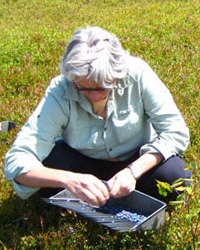![]()
|
Susan Harding Reflects on the Stories and the Project |
Listen |
|
|
|
Reflections |
[Once the audio is playing, click and drag across the volume bars to change volume. Initial volume set to 80%.] |
|
Susan, one of the Gleaning Stories Project members and a cultural anthropologist, reflects on the stories and on the project. She finds some of the concepts of her anthropological work — like "secular sabbath", "ritual practice", "boundary crossings", and "pilgrimages", for example — useful in thinking about the practice of gleaning, about gleaners' stories, and about the Gleaning Stories project. Some of her reflections comment directly on some of the themes and connections Donna describes and on the Gleaning Stories project itself. |
||
|
Secular Sabbath Saturday morning, for those for whom it is not already their religious sabbath, is a time in many gleaners' weekends that comes to be a kind of "secular sabbath". They choose to do something meaningful, to give back, to make a difference. It becomes "charity plus". |
||
|
Ritual Practice Our collective gleaning is also marked by practices that can be fruitfully considered using the notion of "ritual". We move out of our homes and familiar spaces to somewhere else where we experience what anthropologists call "communitas". What other world do we enter? | ||
|
Becoming Other These rituals give us access to a space where we become Other, where we experience something different. Many gleaners remark on wanting to experience some of what field workers do ... though with the understanding that they weren't becoming field workers. Respect. Empathy. A physical and imaginary way to inhabit a new space. Many remarked on the privilege of the experience, the gift. |
||
|
Boundaries Part of what ritual practice allows is crossing boundaries. That's one of the ways people of so many different backgrounds come together ... and speculate on where others were coming from. The difference between the highway and the field — between observer and worker — was only one of the boundaries gleaners talked about crossing when they explained what gleaning meant to them. For gleaners, second only to helping others was the concern with waste, particularly in agriculture, and being able to do something about it. |
||
|
Pilgrimages and Reversal Both pilgrimages and reversals are kinds of ritual that gleaning echoes. Pilgrimages were constantly a bit out of control. Gleans are not tightly controlled, and there is often an element of revelry. And rituals of reversal, like Carnivale, involve role-switching and disguise, to enter a different role. But in spite of their apparent revolutionary potential, rituals of reversal always end up reproducing the existing order. Susan also remarks on the nature of charity as always directed from haves to have nots, something gleaners and project members Mauricio and Christina were very aware of and wanted to change in the case of gleaning. Susan speculated on how recently gleaning has taken on that character. |
||
|
Changing Contexts and Meanings of Gleaning Susan finds this year's gleaning has a sharper edge because of the increased economic hardship. She also reflects on how our changing awareness of big agriculture over the past 5 years and of global warming over the past 10 years have changed the experience of being in the fields and of gleaning. Awareness of waste, recycling, re-purposing, and consumption have changed the way gleaners view gleaning. And in a very American, democratic, individualistic way, the meanings we glean from our gleaning are uncontrolled and up to each of us to construct and express. |
||
|
Gleaning Stories, Gleaning Change Susan reflects on how a story project can change an experience like gleaning. Listening to other gleaners, getting a sense of who else is gleaning, can create a consciousness. She suggests that this kind of project might be abstracted for other context. It's an intervention. |
||
Note: If you have any trouble using the audio buttons on this webpage, please let us know.
![]()

![]()

![]()

Partially Funded by the California Council for the Humanities, UC Santa Cruz, and INTA - TrainingWeal.

